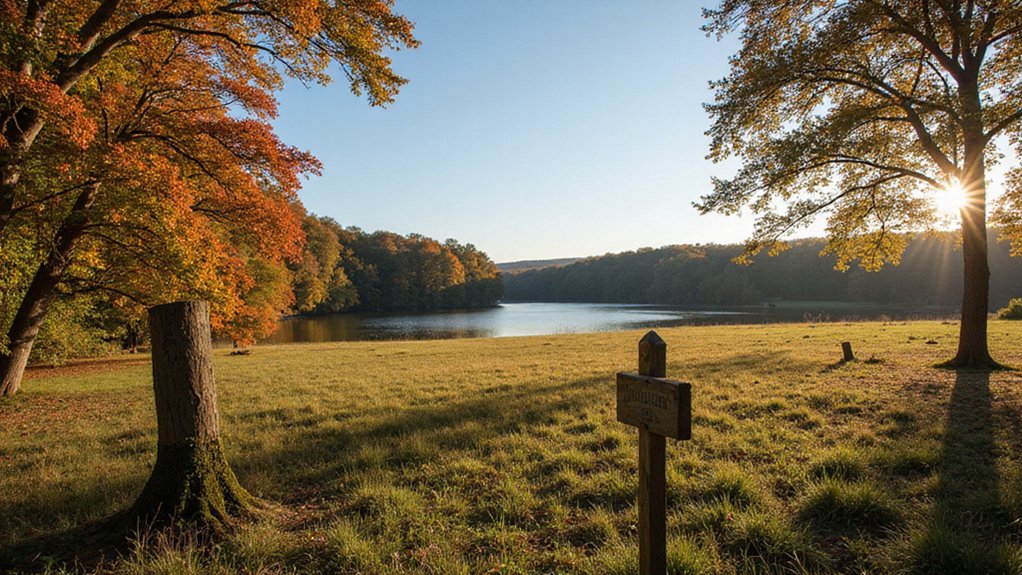Leasing hunting land can be a strategic way to secure a prime spot for your outdoor pursuits. You need to take into account your goals and the type of game you want to hunt. Finding the right property involves more than just a simple agreement; it requires careful thought and negotiation. Let’s explore the key steps to guarantee you make an informed decision and avoid potential pitfalls.
How to Lease Hunting Land Effectively
When it comes to leasing hunting land effectively, what steps should you take to guarantee a successful agreement?
First, identify your goals and the type of game you want to hunt.
Next, research potential properties that meet your criteria.
Once you find suitable land, approach the landowner professionally and express your interest.
Discuss terms openly, including lease duration, payment structure, and any specific rules.
Don’t forget to put everything in writing, ensuring both parties sign the lease.
Finally, maintain a good relationship with the landowner, as this can lead to future opportunities or renewals for your hunting needs.
What Should You Consider When Leasing Hunting Land?
Before you sign a lease for hunting land, it’s important to evaluate several key factors that can impact your experience.
Consider the following:
- Location: Is it easily accessible, and does it offer the wildlife you’re after?
- Size: Does the acreage meet your hunting needs?
- Terrain: Are there diverse habitats and features for better hunting opportunities?
- Rules and Regulations: What’re the property owner’s rules, and do they align with your hunting style?
- Costs: Are there hidden fees, and does the lease fit your budget?
Taking these factors into account will help promote a successful hunting season.
Why Is Leasing Hunting Land a Good Option?
Leasing hunting land offers numerous advantages that can enhance your experience in the field.
First, it provides access to quality wildlife habitats, increasing your chances of a successful hunt. You’ll also enjoy the freedom to scout and hunt without the crowds often found on public land.
Additionally, leasing can save you the hassle of ownership responsibilities, like taxes and maintenance. It allows for more flexibility, letting you choose specific locations and durations that suit your needs.
Finally, you can often establish a long-term relationship with landowners, leading to better agreements and potential improvements in the hunting environment.
How to Find Available Hunting Land for Lease?
How can you find the perfect hunting land for lease? Start by exploring various resources to uncover available options.
Here are some effective ways to locate hunting land:
- Check local classifieds and online marketplaces.
- Connect with real estate agents specializing in rural properties.
- Join hunting and outdoor forums for leads.
- Attend local outdoor expos or hunting shows.
- Network with fellow hunters who might know of available land.
What Are the Costs Involved in Leasing Hunting Land?
Understanding the costs involved in leasing hunting land is essential for making an informed decision.
First, consider the lease fees, which can vary based on location, land quality, and access to resources. You may also need to factor in utilities, insurance, and maintenance costs.
Additionally, don’t forget potential deposits or down payments to secure the lease. Some landowners might request liability insurance, which adds to your expenses.
Finally, think about any necessary permits or licenses for hunting activities. By calculating these costs, you’ll have a clearer picture of your budget and what you can realistically afford.
How to Negotiate a Hunting Land Lease Agreement?
What strategies should you employ to negotiate a hunting land lease agreement? Start by doing your homework on the land’s market value and any specific regulations.
Be clear about what you want and be open to compromise. Here are some tips to guide you:
- Establish a good rapport with the landowner.
- Discuss lease length and renewal options.
- Negotiate the price based on comparable lands.
- Clarify allowed activities and property usage.
- Put everything in writing to avoid future misunderstandings.
With these strategies, you’ll be better positioned to secure a favorable lease agreement for your hunting needs.
What Should You Check Before Signing a Hunting Land Lease?
Before you sign a hunting land lease, it’s crucial to thoroughly evaluate several key factors to guarantee you’re making a sound decision.
First, inspect the property to confirm it meets your hunting needs, including terrain and wildlife presence.
Check the lease terms for duration, costs, and any restrictions on use.
Verify access rights and confirm the landowner’s regulations.
It’s wise to review previous lease experiences, if available, to gauge reliability.
Finally, make sure the lease agreement is clear and detailed to prevent misunderstandings.
Taking these steps helps you secure a suitable hunting experience and protects your investment.
How to Maintain Good Relations with Your Landlord?
Maintaining a good relationship with your landlord can greatly enhance your hunting experience and guarantee smoother interactions. Here’s how to foster that relationship:
- Communicate openly and regularly, updating them on your hunting plans.
- Respect their property by following rules and keeping it clean.
- Offer to help with maintenance or improvements when possible.
- Share your hunting successes and experiences; landlords appreciate knowing how their land is being used.
- Pay your rent on time and honor the lease terms.
